President Park praised Kerry’s diplomatic activities in resolving international issues involving Syria and Iran by saying that he has displayed “excellent capabilities around the globe by traveling overseas, covering a distance equal to 13 times around the earth.”
In response, Secretary Kerry expressed his thanks for President Park’s hospitality and said that President Obama is “very excited” about his upcoming Korea visit this April. “There is a huge need for us to be able to continue to keep our alliance as strong and as effective as it is today. The president and all of us in America believe that this is an essential alliance and a central partnership,” said the U.S. secretary of state. He added that both countries have shared a strong history of 60 years and need to plan for another 60 years.
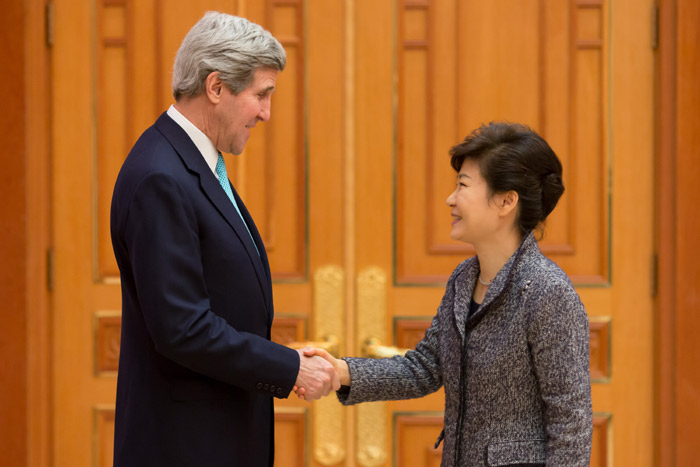
President Park Geun-hye (right) shakes hands with U.S. Secretary of State John Kerry at Cheong Wa Dae on February 13. (photo: Cheong Wa Dae)
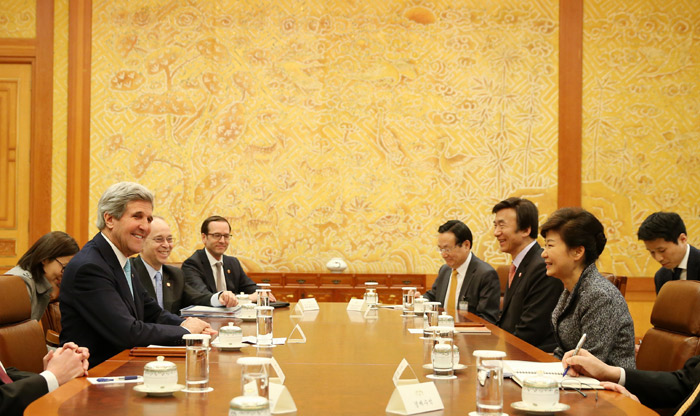
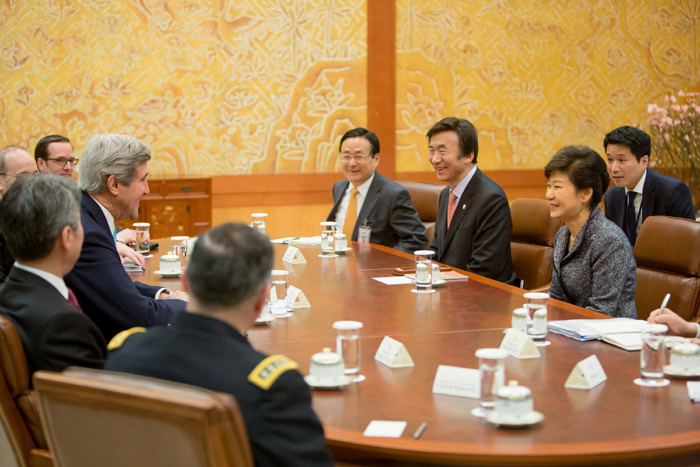
President Park Geun-hye (second from right) holds talks with U.S. Secretary of State John Kerry at Cheong Wa Dae on February 13. (photos: Cheong Wa Dae)
Secretary Kerry said that the North Korean nuclear program remains an essential security issue. He also thanked President Park for her leadership and cooperation on Afghanistan, Syria, and Iran, and said that he looks forward to continued productive talks.
On the same day, the U.S. secretary had a meeting with Minister of Foreign Affairs Yun Byung-se. “In both diplomatic and security terms, close, trilateral cooperation between Washington, Seoul and Tokyo remains essential,” said Kerry at the meeting. He also said that both the United States and he will continue to encourage both allies, Korea and Japan, to find a mutually acceptable approach to legacy issues from the past and to find ways of enhancing the bilateral and trilateral cooperation that will define the future.
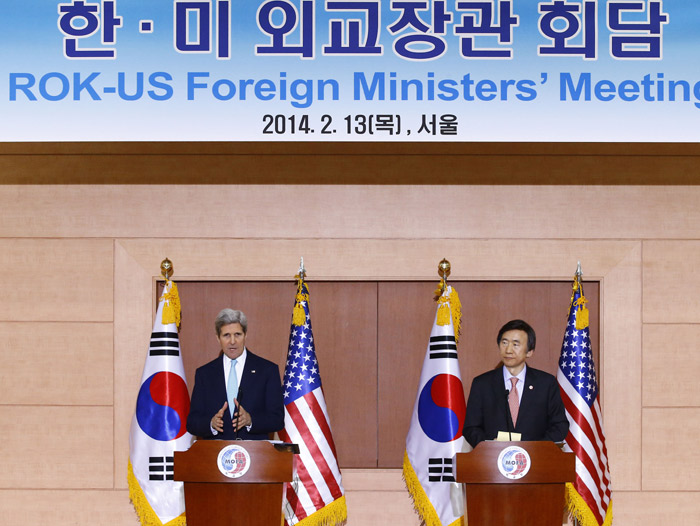
Foreign Minister Yun Byung-se (right) and U.S. Secretary of State John Kerry hold a joint press conference after a summit meeting in Seoul on February 13. (photo: Yonhap News)
In regard to the family reunions involving separated families of the two Koreas, the U.S. secretary said that the family reunions are “a matter of human rights” and that they should not be an excuse to somehow place conditions on the other, while stressing that the joint military drills between Korea and the U.S. will be held according to schedule.
Foreign Minister Yun Byung-se told his U.S. counterpart that Korea-U.S. relations are in great condition and that President Obama’s visit will be very timely, considering the recent surrounding conditions on the Korean Peninsula.
They shared the common view that a meaningful advancement would be possible only when the international community is united in regard to the North Korean nuclear issue. Based on the Korea-U.S. alliance, the two agreed to make continuous efforts to lead Pyongyang toward denuclearization, along with the involvement of neighboring countries, including China.
Both Yun and Kerry reaffirmed the fact that Washington supports the unification of the Korean Peninsula and agreed to strengthen strategic cooperation in regard to sustainable peace and the issue of Korean unification.
To resolve tensions in Northeast Asia, labeled as the “Asian Paradox,” the two agreed that improvements need to be made in the relations between all countries in the region. In this respect, they emphasized that acts of brutality that degrade history should never be allowed to damage the trust between neighboring countries.
By Yoon Sojung
Korea.net Staff Writer
arete@korea.kr
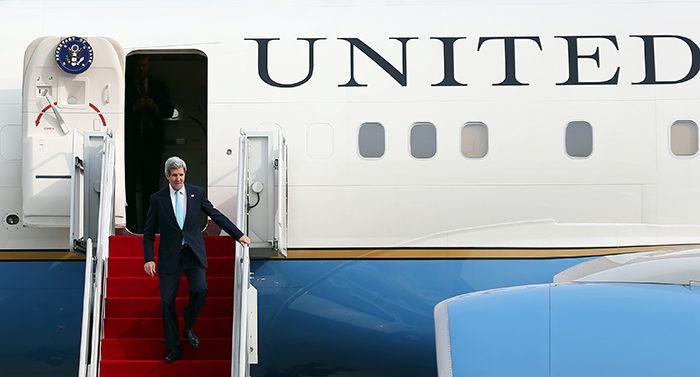
U.S. Secretary of State John Kerry deplanes after arriving at Seoul Airbase on February 13. (photo: Jeon Han)
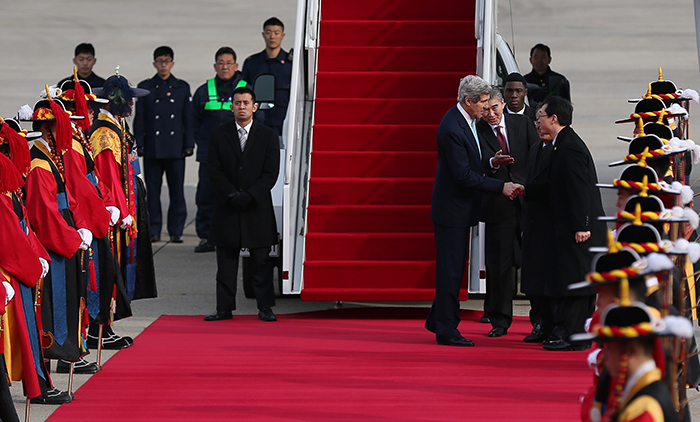
U.S. Secretary of State John Kerry is welcomed to Korea after arriving at Seoul Airbase on February 13. (photo: Jeon Han)
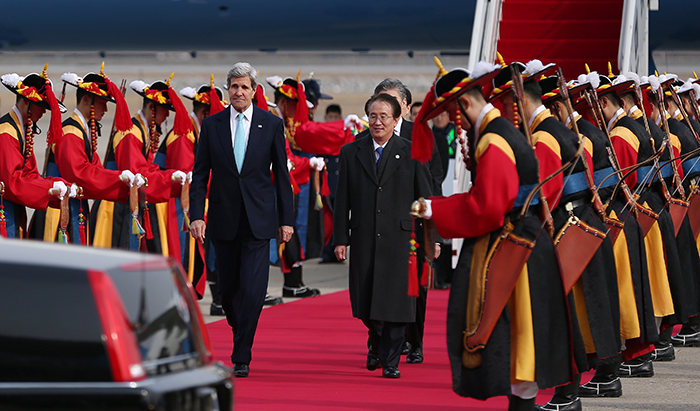
U.S. Secretary of State John Kerry inspects the honor guard after arriving at Seoul Airbase on February 13. (photo: Jeon Han)